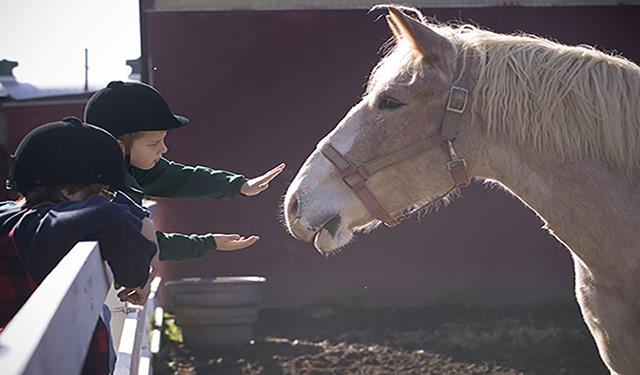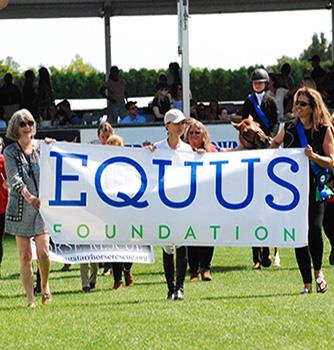Once a week, the American Saddlebred Horse Association (ASHA) shares a school-horse appreciation post on social media for what they’ve dubbed “Feed Your Favorite Lesson Horse Friday.” There’s also “Tip Your Groom Tuesday” and “Support a Horse Show Super Hero Sunday,” which are all designed to encourage equestrians to give money to support lesson programs and horse show support staff. While spring would typically be a busy time of year for the equine industry, this year is different, and people in the horse world have come up with creative ways to support each other.

“The Joint Leadership Council (JLC) comprises members from the leadership at the American Hackney Horse Society, American Morgan Horse Association, American Road Horse & Pony Association, American Saddlebred Horse Association, and United Professional Horsemen’s Association,” says Jessica Cushing, Marketing and Communications Manager for the ASHA. “The inspiration behind the JLC COVID-19 social media campaign was to be a voice and consistent promotional message for the difficulties many of our barns, professionals, and equine industry contractors in our community would be facing without the ability to give lessons and attend shows.”
The JLC’s social media campaign has been running for nine weeks, and Cushing says every post continues to receive positive engagement from the community.
“Our professionals are thankful for the recognition that business is still not back to normal, and there are a great many still in need,” says Cushing. “The ability to help spread the word that people are in need has seen countless success stories of lesson horses being sponsored, grooms getting extra support, and a great ‘pay it forward’ lunch program that emerged amongst barns.”
Other segments of the equine industry have launched similar initiatives during the pandemic shutdown. To help keep school horses fed during their furlough, the United States Hunter Jumper Association launched a Feed Aid Initiative to help USHJA members obtain free or discounted feed for lesson horses. Applications are being accepted now through June 1.
Monetary donations to the USHJA’s Feed Aid Initiative are tax-deductible and will be matched by the USHJA Foundation up to $300,000.
The PonyApp and Connolly’s Red Mills have also teamed up to give away feed to lesson barns this spring. Nominations of barns and programs in need are accepted now at ponygroceries.theponyapp.com.
Rescue Relief
In times of hardship, horse owners may find it increasingly difficult financially to maintain an ideal level of care for their horses. Fortunately, the equestrian community has built safety nets to help horses and their owners when hard times hit.
Equine rescue operations are often pushed to their limits in an economic downturn due to owners who can no longer afford to keep their horses and a market with more horses than potential buyers. Most equine rescues operate on a local basis, taking in horses and facilitating adoptions within a certain geographic area. National programs help support those organizations.
The EQUUS Foundation offers financial support to equine organizations that are part of its Guardians program. These organizations are put through a rigorous vetting process every year to ensure high standards of horse care and transparent and accountable operations.
“For horses to remain an important part of American life and have a viable future, we need to ensure that donor dollars are being spent on programs with the greatest impact,” says Lynn Coakley, President of the EQUUS Foundation.

EQUUS Foundation Guardian Charities include those that provide shelter and rehabilitation for abused, neglected, and at-risk horses; retraining and rehoming for horses in transition; peaceful and humane retirement options for aged equines; and/or are organizations that provide equine-assisted therapies and activities in a way that is beneficial for horses and humans.
Coakley says that many of their Guardian charities have had to cancel fundraising events and close their doors to volunteers, which creates an immediate need for resources.
“Instead of waiting until the end of our fiscal year in August, the Board of Directors approved the immediate allocation of $100,000 to help ease the stress of EQUUS Foundation Guardian charities,” says Coakley. “Each eligible charity will receive a $500 grant for horse-care costs upon approval of its 2020 EQUUS Foundation Guardian Seal. As of today, we have awarded grants to over 67 charities and expect to reach at least 150 charities by June.”
“Rescues have had to cancel or postpone fundraising events for the foreseeable future, and many of them have experienced a severe decline in online donations since COVID-19 [closures] started in March,” says Cheryl Jacobson, Deputy Director of Equine Protection for the Humane Society of the United States (HSUS). “While many rescues have hay, feed, and funds for several months, some rescues are not as fortunate and need help to feed their equines while they find additional avenues for fundraising.”
HSUS awards grants to non-profit rescue organizations across the country. In order to qualify for an HSUS grant, organizations must be accredited or verified by the Global Federation of Animal Sanctuaries, be members of the Homes for Horses Coalition, or have been directly vetted by HSUS.
“HSUS contacted 440 Homes for Horses Coalition members in early March,” says Jacobson. “We collected information on whether they are open or closed to the public, how many equines they have on site and in foster homes, how long they have feed, hay, and meds for, and any other information they could provide us with. We noted which rescues mentioned that they were in dire need of emergency hay funds. As we were able to secure funding, we started providing grants to the rescues in dire need, and the amount was based on the number of equines in their care.”
Jacobson explains that grant applications are sent to rescues as more funding becomes available. As of this writing, HSUS’s Equine Protection Program and the Homes for Horses Coalition have awarded grant funds to 33 rescues. HSUS has provided additional grant money through its main COVID-19 grant budget.
US Equestrian has provided a USEF Disaster Relief Fund grant to support both the Equus Foundation Guardian Charities and HSUS’s Equine Protection Program to help horses in need due to the effects of the COVID-19 pandemic.
Help for Horse People
- Equine safety-net programs offer direct financial support to owners who need short-term assistance to keep their animals, thereby helping to keep horses from entering the rescue system. The Homes for Horses Coalition maintains a searchable list of safety net programs by state that assist owners with emergency funds, feed, veterinary care, or other essential expenses. The United Horse Coalition also provides a comprehensive listing of local and national equine relief programs on its website.
- The Equestrian Aid Foundation is currently assisting equestrian professionals and service providers through its Disaster Relief Fund. Individuals who make their living through the horse industry and have lost their income as a direct result of the pandemic can apply for a one-time emergency grant payment of $500 to assist with basic living expenses.
- In addition to its ongoing social media campaigns, the JLC is providing funds to horse trainers, riding instructors, and horse show staff in the trotting breed industry who have lost income due to COVID-19 through its Horsemen’s Relief Fund. At www.jlccares.com, equine industry professionals can find resources for financial assistance and creative solutions for generating income during the shutdown.
- The Show Jumping Relief Fund was created to provide immediate financial assistance to horse show staff, including ring crew, grooms, braiders, and officials, who have lost income as a result of COVID-19 closures. Information on how to apply for assistance or donate to the fund is available at showjumpingrelieff.wixsite.com/home.
Get Involved
For equestrians who are able to give back during this time, there are several ways to help.
If you have room in your barn, consider adopting or fostering a horse in need. This will help free up space and resources at a local rescue. One place to start is MyRightHorse.org, a search engine established by The Right Horse initiative that helps connect available horses of all ages, breeds, and types with prospective adopters across the country. Fostering an adoptable horse will not only help ease the burden on rescue organizations, but will give that horse more one-on-one attention and human interaction to improve their adoptability.

Photo: Kristin Gray
In addition to accepting direct donations for the Disaster Relief Fund, the Equestrian Aid Foundation has also partnered with other organizations that are donating partial proceeds from goods and services to the Fund. Find the current partnerships at www.equestrianaidfoundation.org/community-initiatives-ways-to-help.
If you are able, contributing financially to a reputable organization can help bring some immediate financial relief.
“Thanks to a generous challenge gift from an anonymous donor, every $1 you donate now becomes $2—up to a maximum of $25,000—to help feed and care for horses at our Guardian charities during the COVID-19 pandemic,” says EQUUS Foundation President Coakley. “Every gift goes directly to underwrite actual horse-care costs like feed, bedding, veterinary, dental, and farrier care.”
The matching donation challenge applies to donations made now through June 30. Visit www.equusfoundation.org/give to donate.
“In addition, while the many barns and equine organizations we support had to temporarily close their doors to volunteers due to social-distancing requirements, many are now beginning to reopen with precautions in place,” says Coakley. “Volunteers are the lifeblood of many equine organizations, and volunteering is a great way to learn about and be close to horses and nature while giving back, making friends, and staying in shape! Learn more about our Champions Volunteer Incentive Program sponsored by Ariat International at www.equusfoundation.org/champions.”
There are always opportunities to provide assistance and give back to the equestrian community, whether that’s by contributing to the barns and shows that would normally have your business at this time of year or by seeking out people in need in your extended network.
“From the first week [of the JLC’s social media campaigns], we had a very generous member of the show-horse community sponsor a whole program of 10+ horses for a month,” says Cushing. “Their barn does not have a lesson program, but they were inspired to help. The ‘Feed Your Favorite Lesson Horse’ campaign helped them find a barn in need and a way to support our community through these challenging times.
“Every day we were getting tagged in photos of barns whose clients, friends, and peers stepped up to send the whole barn lunch and help keep spirits up,” Cushing continues. “It has also been humbling to see barns and industry vendors find creative ways to give back to the JLC Horsemen's Relief Fund through hosting fundraisers or donating part of their proceeds from sales to our grant program.”


